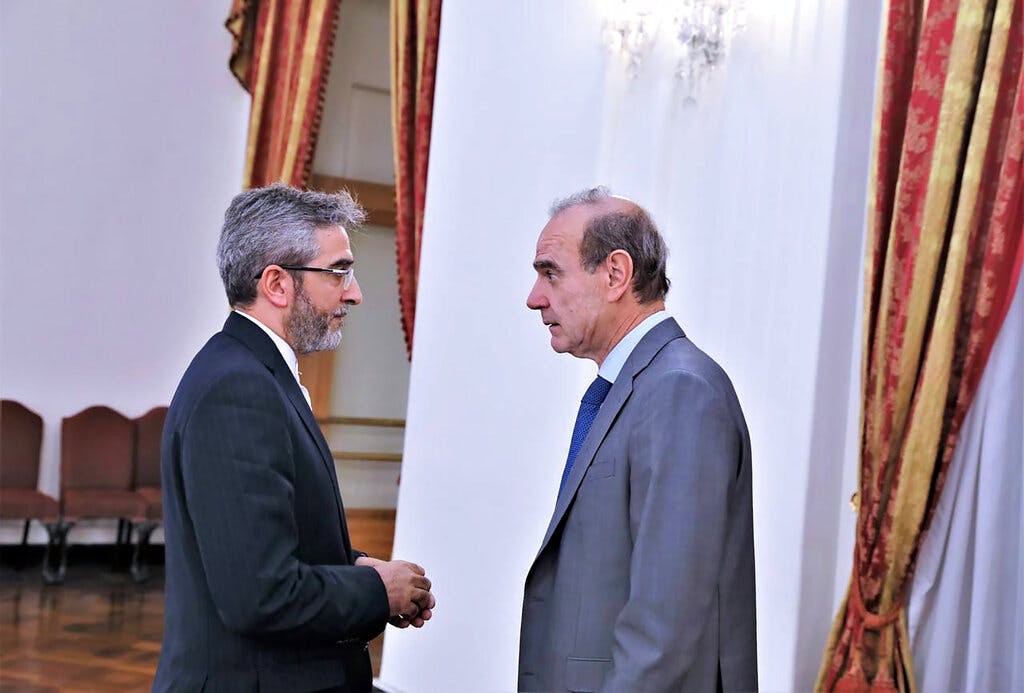Iranians Appear To Be Ratcheting Up Hostage Diplomacy
The arrests of two Europeans and a death sentence were announced just as a EU coordinator for the nuclear talks was landing at Tehran.

Landing at Tehran today, a European Union coordinator for the Iran nuclear talks, Enrique Mora, was confronted with news about his interlocutors’ cruelest negotiation tactic: hostage taking.
As the Associated Press described a photo taken at the airport, Mr. Mora was “looking stern as he shook hands awkwardly with Iranian negotiator Ali Bagheri Kani, who beamed and waved.”
The European negotiator’s evident unease, and perhaps his Iranian counterpart’s glee, resulted from an announcement by Tehran’s intelligence ministry that two unidentified Europeans had been detained earlier Wednesday.
To add insult to injury, a state-controlled media outlet, ISNA, reported today that a Swedish national, Ahmadreza Djalali, who was arrested in 2016 on what observers said were trumped up charges, will be executed on May 21.
The intelligence ministry provided no details about the newly detained Europeans, other than saying they were both from the same country. The charges against them were described only vaguely, contending they planned to cause “chaos, social disorder, and instability.”
As yet no European country has made a public announcement about citizens detained in Iran. Yet, the mere announcement that arrests were made just as Mr. Mora landed was a signal that the Iranian regime is returning to its use of Western hostages as bargaining chips in negotiations.
“Is this the way to negotiate? Mora should go home,” one of the 52 American diplomats Iran held hostage in 1979, Barry Rosen, told the Sun.
Ever since that hostage crisis at the onset of the Khomeini revolution, the Islamic Republic has used the arrest, torture, and execution of Westerners as one of its top tools for advancing diplomacy.
“The Iranian regime’s threat to execute Ahmadreza Djalali and its most recent move to detain more European nationals are simply more examples of its heinous proclivity to take hostages to use as political leverage to accomplish its goals,” Mr. Rosen said.
As American and European diplomats make valiant but unsuccessful efforts to curb Iran’s nuclear aspirations diplomatically, Tehran seems to hope that hostage-taking would hasten Western concessions.
Rising oil prices contribute to inflation and a global economic slowdown. Washington and its European partners are eager to end sanctions that were imposed on Iran when President Trump withdrew from the JCPOA in 2018. Their aim is for Iranian oil to offset energy deficits resulting from current sanctions imposed on Russia.
With his Tehran visit Mr. Mora has been attempting to end a stalemate that has existed since March, when talks with Iran at a Vienna hotel were suspended. At that time the regime demanded the removal of its Islamic Revolutionary Guards Corps from America’s list of foreign terrorist organizations.
In January Mr. Rosen went on a hunger strike in Vienna, demanding that negotiators there address Iran’s hostage-taking. Alongside some partners he now continues to highlight Iran’s use of “blackmail” as a negotiation tactic.
Mr. Mora should “demand an end to this behavior,” one of Mr. Rosen’s partners, a former Polish minister of defense and foreign affairs, Radoslaw Sikorski, said in a statement. “Hostage diplomacy is intolerable and must be stopped,” he said.
Beyond JCPOA-related concessions, Iran hopes the plight of Westerners like the Swedish Mr. Djalali would force the West to bend to its will.
Tehran’s foreign minister, Hossein Amirabdollahian, is demanding the release of an Iranian man on trial in Sweden, Hamid Noury, in return for Mr. Djalali’s release. Sweden has so far refused to budge.
The difference between the two cases could not be starker. The Iranians claim that Mr. Djalali, a medical doctor specializing in disaster relief, is an Israeli spy. Unlike Mr. Noury’s case, though, the espionage charges have not been substantiated and no public evidence has been provided.
Swedish law allows trials involving dual citizens accused of war crimes and human rights abuse that were committed outside the country. Mr. Noury, a Swedish-Iranian, was tried for his role in the 1988 killing of more than 5,000 political prisoners at Iran’s Gohardasht prison. The verdict in the case is scheduled to be announced in July.
The 1988 prison massacre was committed under orders from the Iranian judiciary chief at the time, Ebrahim Raisi, who is currently the country’s president.
While his heart goes out to Mr. Djalali’s family, Mr. Rosen said, Sweden is “absolutely doing the right thing” by refusing to exchange Mr. Noury for the wrongfully accused Mr. Djalali.
Further, he says, rather than negotiating with a government headed by Mr. Raisi, the Iranian president should be brought to justice in front of an international tribunal for his role in the same massacre in which Mr. Noury was accused of participating in 1988.

